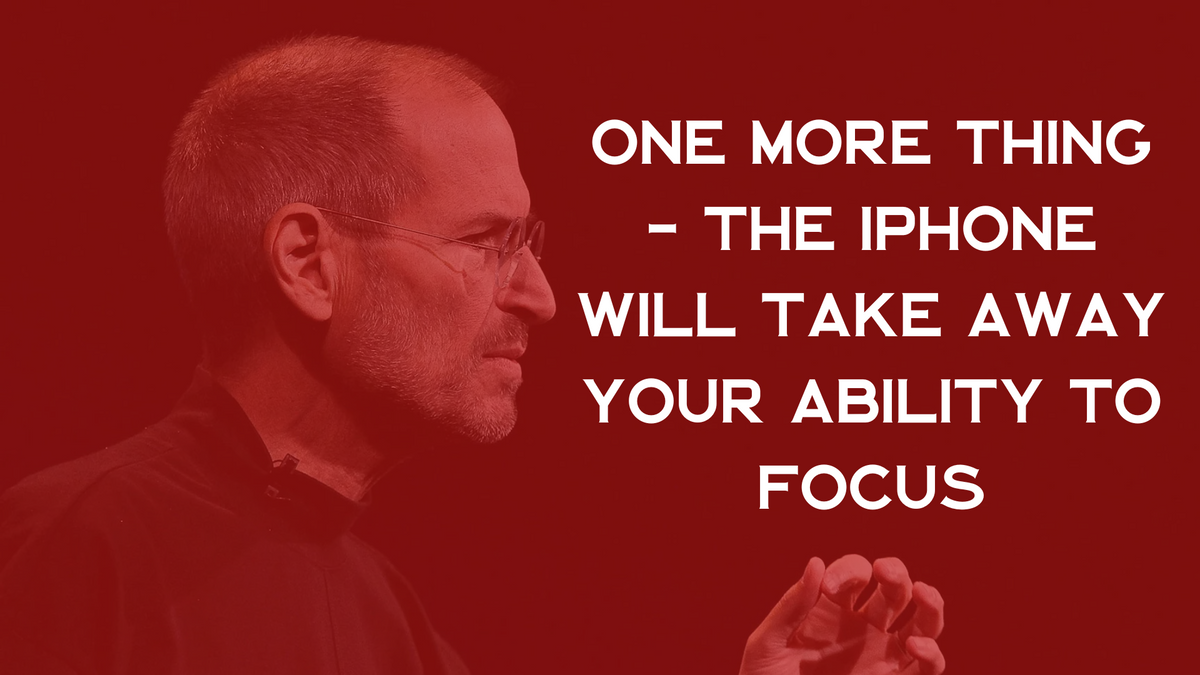How the most focused man stole the world's focus.
If Steve Jobs understood the value of focus, did he not know the products he was selling were destroying focus?

On October 5th, 2011, I was in a small room in the college library studying for my weekly chemistry quiz when my buddy Afaque barged in and breathlessly announced, "Steve Jobs just died!". I vaguely knew who Jobs was then, but not enough to pay a second thought to his death. Don't get me wrong, I absolutely loved Apple Products, but that didn't mean I knew who Steve Jobs was. I remember doing other kids' homework in Junior Highschool to save money for an iPod Video. In 2007 when Apple announced the iPhone, I was dumbfounded; just the "swipe to unlock" had me gripped. Back then touch screen phones looked like this:

In fact, I loved Apple products so much that when it came time to buy a laptop for college, I bought a MacBook Pro, even though I was an engineering student and Macs had terrible support for the software I'd have to use. Apple products just had this special aura about them. They were sexy, they always worked, and using them was a pleasure.

I didn't know much about Jobs when he died, but that didn't last long. His death gripped the public attention as few deaths did. I remember sitting there reading article after article about him on my MacBook Pro and slowly starting to get the sense that Steve Jobs was what had made Apple products so unique. The infatuation and amazement I had with my Apple products began to spread to the person of Steve Jobs. I'd never considered there was a person behind Apple Products. I was the peak American consumer; I got my product and didn't think at all about the process it had taken to get it to me. Those news stories in the following weeks prompted me to begin looking at my Apple products, and the more I looked at them, the more I fell in love with them, and the more I fell in love, the more I became fascinated by the late Apple founder.
When a few months later, I saw that there was an official Steve Jobs biography released, I knew I had to read it. It's a bit embarrassing to admit, but Walter Isaacson's Steve Jobs is one of the books that changed my life forever. Some books are just electric, and this one was like chewing on a live power line. See, you have to realize I picked up this book when I was 19 years old. I had just finished my first year of college, and I hated it. I didn't know where I was going or what I wanted. All I knew was I didn't care about going to school so I could get a job in 4 years. I didn't know what I wanted from life. Enter the Steve Jobs biography, arguably the most unbelievable life story in modern history. A middle-class smart aleck with limitless bravado re-invents the computer industry, the film industry, the music industry, and the mobile industry, makes billions of dollars doing it, and oh, everywhere you look, people are carrying around his inventions.

I didn't know what I wanted from life but seeing a full life like Jobs' lit a fire inside me. Realizing a person could have an impact like that is what inspired me to want to be an entrepreneur. Jobs is undoubtedly the inspiration and example many entrepreneurs follow. Now here is where things get interesting. Steve Jobs prized focus above all else. One of the main things he did at Apple was reign in his team's focus. In his personal life, he prized focus, pursuing it through diets, meditation, and even how he dressed. Any entrepreneur who looks up to Steve Jobs will have tried to sharpen their ability to focus. The focused mind is man's greatest weapon, and Jobs understood this. That fact has put an itch in my mind I just can't scratch. If Steve Jobs understood the value of focus, did he not know the products he was selling were destroying focus?
Consider the iPod. The iPod changed humanity's relationship with music forever. Yes, I know, there were mp3 players and Walkmans before the iPod, but the iPod + the iTunes store made the process of listening to music frictionless. The iPod allowed people to stay constantly plugged into their music in a way that the Walkman and mp3 players didn't. There was a time before ours when listening to music was a sit-down event; you'd get your stereo powered up, you'd sit, and you'd listen to music. The act of listening to music was a self-contained event. No more. Now music can be your constant companion. Here's what that means:
1) Constantly being plugged in isolates you from your environment,
2) Constantly listening to music taps out your supply of dopamine (source)
3) The music you're plugged into is constantly playing with your mood (source)
4) Music becomes a crutch for carrying out menial and tedious tasks.
I had four different iPods growing up; I loved them. But I look back on the experience, and I wonder if the introduction of the iPod was a net negative for human focus. In his maniacal focus, Jobs crafted a device that would constantly give us that delicious dopamine hit and keep us coming back for more. The greatest drug dealer could only dream of a product as potent as the iPod.
And while the drug dealer couldn't dream of a product as potent as the iPod - Jobs dreamt up one incalculably more potent - the iPhone.
The iPhone has kind of become my sworn enemy. Aside from actual hard drugs, I do not think there has been anything in history as destructive to human focus as the iPhone (and all the other phones it spawned). Are smartphones useful? Yes. Have they made our lives better? Yeah, but at a certain point, we're getting diminishing returns. The cons of smartphones are starting to outweigh the pros. Look around you right now; if you're around people, they're probably on their phones or about to be. The odds are you're reading this on your phone. We rarely have quiet bored moments today; the phone is constantly engaging us. It's not our fault, either. Our smartphones are hitting on our fundamental biological needs. The evolutionary hunger for novelty and new information? Check. Connection with people we love? Right on your screen, baby. Porn? Just a click away. Dopamine from entertainment? You have all of the world's entertainment in your pocket. We're no match, and it's the silent epidemic of our age. People's ability to focus has absolultey been decimated. I have been in work meetings where people discuss million-dollar projects, and key individuals in the meeting get sucked into their phones. I'll be with a friend I haven't seen in months, get a notification, check it, and then automatically click the Instagram icon for some crispy dopamine. Holy crap.
I don't know if Jobs knew. I think he knew. I mean, here you have the man who architected the greatest consumer products in history. He had an intuitive sense of what clicked. He famously said the icons on the iPhone looked so good you wanted to lick them. I hear that statement, and it tells me he was sensitive to what captured our attention, and therein lies the problem I have with Steve Jobs. The man developed his focus to the point where he intuited what resonated with people, and then he got us all hooked.
In the 1980s, Jobs gave a talk where he likened the computer to a bicycle for the mind. There had been a study where it showed the efficiency of animals in locomotion; in plain speak, that means which animals spent the least energy to move. The study had shown that the condor was the most efficient animal; it barely exhausted itself to move over long distances. Humans, compared to the condor, had to really work to move over long distances, but here is where it gets interesting. If you put a human on a bicycle, suddenly, their efficiency blows the condor's out of the water. The bicycle, as a tool, allowed us to do much more than we could without it. Jobs then went on to say the computer was like a bicycle but for the mind, that with it, we could do so much more. I think that still holds true for the computer, and I think it was the aim for the smartphone, but our current relationship with the smartphone is not bicycle as much as it is runaway train. Who's in charge, you or your phone? Do you find yourself checking your phone constantly? How's your screen time?
Few people have an impact on humanity on the scale that Steve Jobs did. His achievements and the company he built are extraordinary, but the most important thing in the world is not technology, Apple, or money. The most important thing in the world is humans, and the most important thing for humans is our ability to focus. Our ability to focus has advanced our species and allowed us to build things like the iPhone. Anything which threatens focus has to be addressed and dealt with. I will always admire Steve Jobs, but admiration doesn't mean following blindly. We are grateful to Jobs and Apple for what they have given us, but I believe the products they have given us have deviated away from their original purpose. I wonder if Steve Jobs could have been Steve Jobs if he'd had the iPhone. Probably, but he'd have handled it super carefully - making sure it didn't affect his focus.
